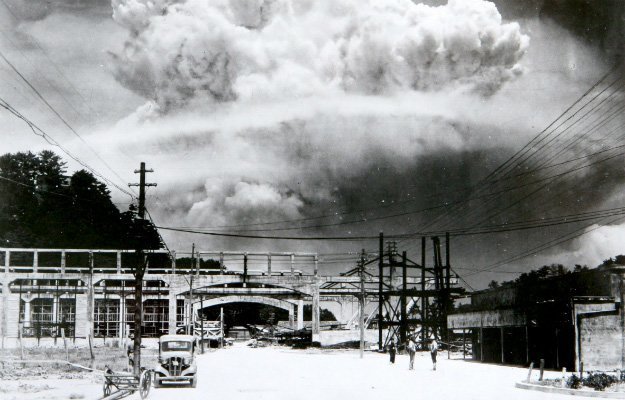
Fredsprisvinner Barack Obama unnlot bevisst å be om unnskyldning på vegne av USA for atombomben da han besøkte Hiroshima. I en artikkel i Los Angeles Times tar Oliver Stone og Peter Kuznick et grundig oppgjør med den vanlige, men falske forestillinga om at det var atombombene over Hiroshima og Nagasaki som stanset annen verdenskrig:
Truman exulted in the obliteration of Hiroshima, calling it “the greatest thing in history.” America’s military leaders didn’t share his exuberance. Seven of America’s eight five-star officers in 1945 — Gens. Dwight Eisenhower, Douglas MacArthur and Henry Arnold, and Adms. William Leahy, Chester Nimitz, Ernest King and William Halsey — later called the atomic bombings either militarily unnecessary, morally reprehensible, or both. Nor did the bombs succeed in their collateral purpose: cowing the Soviets.
Leahy, who was Truman’s personal chief of staff, wrote in his memoir that the “Japanese were already defeated and ready to surrender…. The use of this barbarous weapon at Hiroshima and Nagasaki was of no material assistance in our war against Japan.” MacArthur went further. He told former President Hoover that if the United States had assured the Japanese that they could keep the emperor they would have gladly surrendered in late May.
Altså, ikke bare Oliver Stone og jeg, men sju av USAs åtte femstjernes generaler etter 1945 har kalt atombombinga enten militært unødvendig, moralsk forkastelig – eller begge deler. En av disse, Dwight D. Eisenhower ble dessuten president i USA.
Stone og Kuznick skriver videre:
It was not the atomic evisceration of Hiroshima and Nagasaki that ended the Pacific war. Instead, it was the Soviet invasion of Manchuria and other Japanese colonies that began at midnight on Aug. 8, 1945 — between the two bombings.
For months, Allied intelligence had been reporting that a Soviet invasion would knock Japan out of the war. On April 11, for example, the Joint Intelligence Staff of the Joint Chiefs of Staff predicted, “If at any time the USSR should enter the war, all Japanese will realize that absolute defeat is inevitable.”
Visestabsjefen i den japanske generalstaben sa under avhør seinere at generalstaben ikke var klar over hvor omfattende ødeleggelsene i Hiroshima og Nagasaki var for seinere. Det var det at Sovjetunionen gikk inn i krigen mot JHapan som var det store sjokket:
The atomic bombings, terrible and inhumane as they were, played little role in Japanese leaders’ calculations to quickly surrender. After all, the U.S. had firebombed more than 100 Japanese cities. Hiroshima and Nagasaki were just two more cities destroyed; whether the attack required one bomb or thousands didn’t much matter. As Gen. Torashirō Kawabe, the deputy chief of staff, later told U.S. interrogators, the depth of devastation wrought in Hiroshima and Nagasaki only became known “in a gradual manner.” But “in comparison, the Soviet entry into the war was a great shock.”
I en artikkel på steigan.no drøftet Erik Plahte dette i 2015, og kom til samme konklusjon. Les: Hiroshima, Nagasaki og bombing som strategi.
Les også: Samtidig øyenvitnerapport fra Hiroshima og Nagasaki


 oss 100 kroner!
oss 100 kroner!